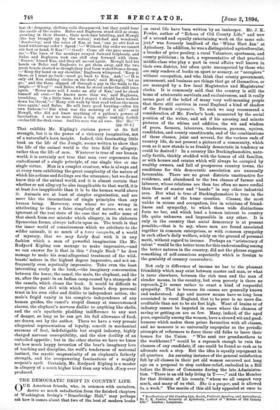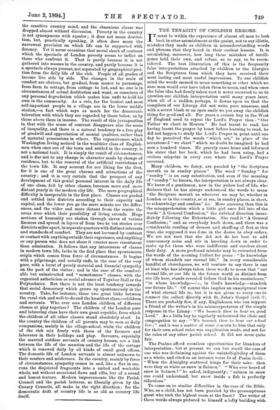THE DEMOCRATIC DRIFT IN COUNTRY LIFE.
OUR American friends, who, in common with ourselves, derive so much satisfaction from the finished chapters of Washington Irving's " Bracebridge Hall," may perhaps ask how it comes about that two of the best of modern books on rural life have been written by an innkeeper. Mr. J. K. Fowler, author of "Echoes of Old County Life," and now of a second and equally entertaining work on the same sub- ject,* was formerly landlord of the 'White Hart inn' at Aylesbury. In addition, he was a distinguished agriculturalist, a breeder of prize poultry, a rural Volunteer, sportsman, and county politician ; in fact, a representative of that practical middle-class who play a part in rural affairs well known in their own district, but often quite unsuspected by those who are only readers of books on sport or scenery, or " occupiers " without occupation, and who think that county government, amusement, and business are things that go of themselves, or are managed by a few local Magistrates and Magistrates' clerks. It is commonly said that the country is still the home of aristocratic survivals and exclusiveness, and it really seems part of the belief of many very well-meaning people that there still survives in rural England a kind of shadow of the French seigneurie. To such we may recommend a consideration of Mr. Fowler's book, measured by the social position of the writer, and ask if his amusing and minute pictures of the whims and oddities, the wit and wisdom of peers, farmers, labourers, tradesmen, parsons, squires, candidates, and county constituents, and of the combinations of these classes, joint and several, for the various ends of country life, do not present a picture of a community, which even as it now stands is as frankly democratic in tendency as could be desired ? In a country like Buckinghamshire, natu- rally fertile, thickly studded with the homes of old families, or with houses and estates which will always be occupied by wealthy owners, and fall of prosperous country towns, the conditions for this democratic association are unusually favourable. There are no great districts unattractive for residence, and abandoned to the two classes of farmer and labourer, whose relations are then too often no more cordial than those of master and " hands " in any other industrial area. But what is true of Buckinghamshire is true in the main of most of the home counties. Classes, the most unlike in means and occupation, live in relations of friend- liness and sympathy, to which these wide distinctions form no bar, and which lend a human interest to country life quite unknown and impossible in any other. It is only in the country that social democracy is at present possible,—that is to say, where men are found associated together in common enterprises, or with common sympathy in each other's daily welfare, solely on the ground of personal merit, without regard to income. Perhaps an "aristocracy of talent" would be the better term for this understanding among the better natures in the country, did not the phrase suggest something of self-conscious superiority which is foreign to the geniality of country camaraderie.
Not only is difference of income no bar to the pleasant friendship which may exist between master and man, or what is rarer elsewhere, between the rich man and the man of slender means, in the country, but even poverty is there no reproach.:It seems rather to exact a kind of respectful sympathy. That is because its causes are generally known and understood. Age and narrow means have so long been associated in rural England, that to be poor is no more dis- creditable than not to be six feet high. Want of brains or of industry cannot be imputed in cases where the chances of saving or getting-on are so few. Many, indeed, of the aged poor, especially among the women, have a shrewd wit and good- humour which makes them prime favourites with all classes, and no measure is so universally unpopular as the periodic attempts of reformers to force these old folks to leave their homes for the Union. "Who sent our grandmothers to the workhouse P" would be a reproach enough to ruin the chances of any candidate, if one could be found so rash as to advocate such a step. But the idea is equally repugnant in all quarters. An amusing instance of the general satisfaction felt by all classes in their pet old women occurred not long ago on a proposal to stop outdoor-relief, embodied in a Bill before the House of Commons during the late Administra- tion. "There is an old lady living in T—," said the Member for that division of his county, "whom we all respect very much, and many of us visit. She is a pauper, and is allowed 3s. a week." The merits of this old lady appealed at once to • Recollections of Old Country Life, Social, Political, Sporting, and elinieultural. By J. K. Fowler, formerly of Aylesbury, author of "Echoes of Old County Life." London: Longmans. the sensitive country mind, and the obnoxious clause was dropped almost without discussion. Poverty in the country is not synonymous with squalor ; it does not mean destitu- tion, but, practically speaking, it often does mean the narrowest provision on which life can be supported with 'decency. Yet it never occasions that moral shock of contrast which the spectacle of London poverty seems to inflict on those who confront it. That is partly because it is not gathered into masses in the country, and partly because it is a spectacle always present, not separated by geographical posi- tion from the daily life of the rich. People of all grades of income live side by side. The changes in the scale of comfort are obvious, but gradual, from manor to parsonage, from farm to cottage, from cottage to hut, and no one is in circumstances of actual destitution and want, or conscious of any personal degradation which makes him unfit to hold his own in the community. As a rule, far the busiest and most self-important people in a village are in the lower middle station,—a fact which says as much for the democratic toleration with which they are regarded by those below, as by those above them in income. The result of this juxtaposition is, that with the sense of contrast disappears also the sense of inequality, and there is a natural tendency to a free play of goodwill and appreciation of mental qualities, rather than of material possessions in others. The expansiveness which Washington Irving noticed in the wealthier class of English- men when once out of the town and settled in the country, is not a national trait. It is simply the result of circumstances, and is due not to any change in character made by change of residence, but to the removal of the artificial restrictions of the town life. It may account for our liking for the first, for it is one of the great charms and attractions of the country ; and it is very certain that the prospect of any development of this genial personal interest in the daily life of one class, felt by other classes, becomes more and more distant yearly in the modern city life. The mere geographical difficulty is insuperable in the first place. Classes are graded and settled into districts according to their capacity and capital, and the lower you go the more minute are the differ- ences, and the wider and more distant from the centre the areas over which their possibility of living extends. Huge sections of humanity are shaken through sieves of various lineness and spread in layers of from two to ten stories over districts miles apart, in separate quarters with distinct interests and standards of comfort. They are not leavened by contrast or contact with anything outside their experience, and anything 'or any person who does not share it creates more resentment than admiration. It follows that any intercourse of classes in modern town life, lacks in the first place that spontaneous origin which comes from fotce of circumstances. It begins with a pilgrimage, and usually ends, in the case of the very poor, with a burst of purely material and financial sympathy on the part of the visitor; and in the case of the comfort- able but uninstructed and " monotonous " classes, with the organised astheticism or social advance of Toynbee Hall or the Polytechnics. But there is not the least tendency towards that social democracy which grows up spontaneously in the -country. Take, for instance, those two great links between • the rural rich and well-to-do and the humblest class,—children and servants. Who ever sees London children of different classes at play together? The children of the London poor and labouring class have their own great republic, from which the children of all other classes stand absolutely aloof. In the country the children of all parents may be seen as daily -companions, mainly in the village-school, while the children -of the rich mix freely with those of the farmers and labourers in their holidays and play. Servants, especially -the married outdoor servants of country houses, are a link between the life of the mansion and the life of the cottage which is renewed daily by all kinds of small good offices. The domestic life of London servants is almost unknown to -their masters and mistresses. In the country, mainly by force of circumstances, sympathy comes in and, like a flux in ore, Tuns the disjointed fragments into a united and workable whole, not without occasional flaws and rifts, but of a sound and honest texture. Modern improvements like the Parish Council and the parish lectures, so liberally given by the County Councils, all make in the right direction ; for the democratic drift of country life is as old as country life







































 Previous page
Previous page